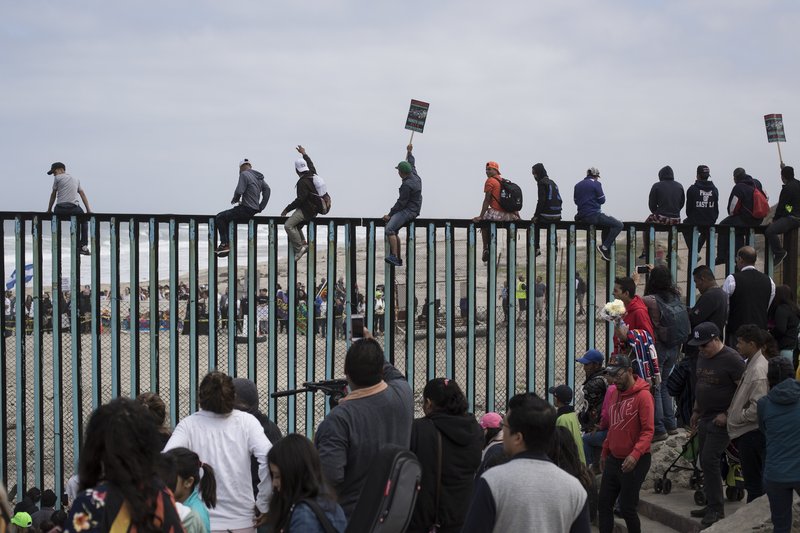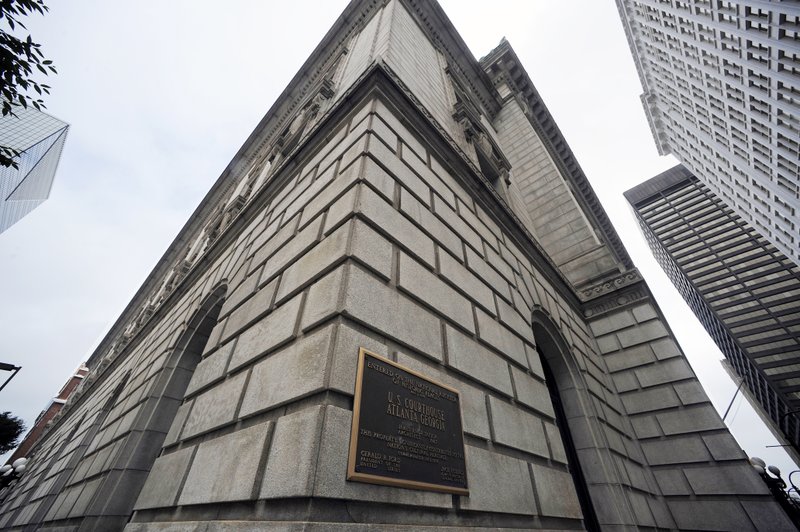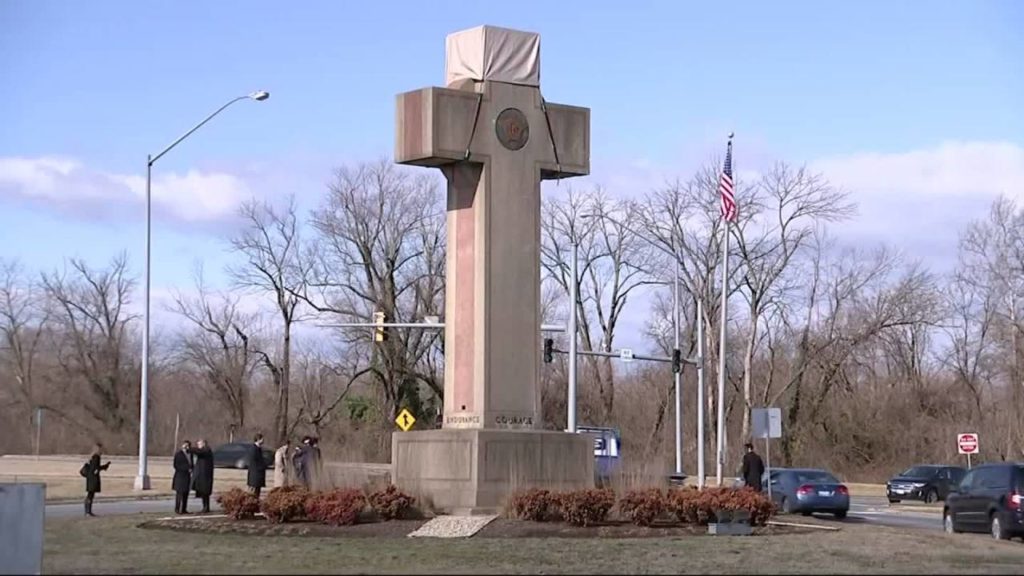House looks set to pass emergency funding bill for migrants

House Democrats were teeing up a vote Tuesday night on a $4.5 billion emergency border aid package to care for thousands of migrant families and unaccompanied children detained after crossing the U.S.-Mexico border. Democratic leaders appeared confident that they had quelled a mini-revolt by progressives and Hispanic lawmakers who sought significant changes to the legislation. New provisions added to the bill Tuesday were more modest than what those lawmakers had sought, but a full-court press by Speaker Nancy Pelosi, Democrat-California, and other party leaders seemed to quiet the rebellion. Passage of the House bill would set up a showdown with the Republican-led Senate, which may instead force Democrats to send Trump a different, and broadly bipartisan, companion measure in coming days as the chambers race to wrap up the must-do legislation by the end of the week. “The Senate has a good bill. Our bill is much better,” Pelosi told her Democratic colleagues in a meeting Tuesday morning, according to a senior Democratic aide who spoke on condition of anonymity to describe the private session. “You can find fault with any bill that comes down the pike, but we must respect the bill for what is does rather criticize it for what it does not.” The bill contains more than $1 billion to shelter and feed migrants detained by the border patrol and almost $3 billion to care for unaccompanied migrant children who are turned over the Department of Health and Human Services. It seeks to mandate improved standards of care at HHS “influx shelters” that house children waiting to be placed with sponsors such as family members in the U.S. Both House and Senate bills ensure funding could not be shifted to Trump’s border wall and would block information on sponsors of immigrant children from being used to deport them. Trump would be denied additional funding for Immigration and Customs Enforcement detention beds. “This is strictly a supplemental that’s in response to a humanitarian crisis that is taking place right now,” said Rep. Lucille Roybal-Allard, Democrat-California, one of the authors of the bill. She said language in the measure limits the use of the funding to “food, clothing, better shelter facilities and so on.” The White House is threatening to veto the House bill, saying it would hamstring the administration’s border security efforts, and the Senate’s top Republican suggested Tuesday that the House should simply accept the Senate measure — which received only a single “nay” vote during a committee vote last week. “The idea here is to get a (presidential) signature, so I think once we can get that out of the Senate, hopefully on a vote similar to the one in the Appropriations Committee, I’m hoping that the House will conclude that’s the best way to get the problem solved, which can only happen with a signature,” said Senate Majority Leader Mitch McConnell, Republican-Kentucky. House Democrats seeking the changes met late Monday with Pelosi, and lawmakers emerging from the Tuesday morning caucus meeting were generally supportive of the legislation. Congress plans to leave Washington in a few days for a weeklong July 4 recess, and pressure is intense to wrap up the legislation before then. Agencies are about to run out of money and failure to act could bring a swift political rebuke and accusations of ignoring the plight of innocent immigrant children. Lawmakers’ sense of urgency to provide humanitarian aid was amplified by recent reports of gruesome conditions in a windowless Border Patrol station in Clint, Texas, where more than 300 infants and children were being housed. Many were kept there for weeks and were caring for each other in conditions that included inadequate food, water and sanitation. By Tuesday, most had been sent elsewhere. The incident was only an extreme example of the dire conditions reported at numerous locations where detainees have been held, and several children have died in U.S. custody. The Border Patrol reported apprehending nearly 133,000 people last month — including many Central American families — as monthly totals have begun topping 100,000 for the first time since 2007. Federal agencies involved in immigration have reported being overwhelmed, depleting their budgets and housing large numbers of detainees in structures meant for handfuls of people. Pelosi warned her colleagues that President Donald Trump’s hand would be strengthened if the legislation failed. “The president would love for this bill to go down today,” she said, according to the aide. “A vote against this bill is a vote for Donald Trump and his inhumane, outside-the-circle-of-civilized attitude toward the children.” Changes unveiled Tuesday would require the Department of Homeland Security to establish new standards for care of unaccompanied immigrant children and a plan for ensuring adequate translators to assist migrants in their dealings with law enforcement. The government would have to replace contractors who provide inadequate care. Many children detained entering the U.S. from Mexico have been held under harsh conditions, and Customs and Border Protection Chief Operating Officer John Sanders told The Associated Press last week that children have died after being in the agency’s care. He said Border Patrol stations are holding 15,000 people — more than triple their maximum capacity of 4,000. Sanders announced Tuesday that he’s stepping down next month amid outrage over his agency’s treatment of detained migrant children. In a letter Monday threatening the veto, White House officials told lawmakers they objected that the House package lacked money for beds the federal Immigration and Customs Enforcement agency needs to let it detain more migrants. Officials also complained in the letter that the bill had no money to toughen border security, including funds for building Trump’s proposed border wall. By Andrew Taylor and Alan Fram Associated Press Republished with permission of the Associated Press.
Federal judges question basis for Alabama minimum wage suit

Several federal appeals court judges appeared skeptical Tuesday of a lawsuit by fast-food workers and civil rights groups accusing Alabama lawmakers of racial discrimination for blocking a minimum-wage hike in the city of Birmingham. The plaintiffs accused the Legislature of targeting a mostly African American city in a way that disproportionately harms black workers. Their argument was ruled plausible last year by a three-judge panel of the 11th U.S. Circuit Court of Appeals, which reversed a judge’s decision to dismiss their lawsuit. But judges on a 12-judge 11th Circuit panel that reheard the case Tuesday spent little time addressing claims of racism, focusing instead on a narrow procedural issue. Some judges questioned whether the lawsuit was properly filed against Alabama’s attorney general. Failure to sue the correct party would get the case thrown out. Judges asked how a court order against the attorney general without additional legal action in Alabama courts would force employers to pay Birmingham’s higher minimum wage. Eric Brown, a plaintiffs’ attorney, said the attorney general is the right defendant because he had the authority to enforce the state law and had shown a willingness to do so, indicating to employers that they need not pay Birmingham’s higher minimum wage. The lone African American judge on the panel, Charles Wilson, pushed back against his colleagues’ concerns that an 11th Circuit ruling wouldn’t affect state courts or employers. Wilson was among the judges on the unanimous, three-judge panel that sided with the workers and civil rights groups. “We only have to do our job,” he said. At issue was a 2016 Alabama statute requiring every city in the state to have a minimum wage tied to the federal minimum wage of $7.25 an hour. The workers and civil rights groups sued after the state law effectively nullified a city council vote to increase Birmingham’s wage to $10.10 an hour. State officials countered that the law is race-neutral and similar to laws in nearly two dozen other states. The three-judge panel said in its ruling last year the “plaintiffs have stated a plausible claim that the Minimum Wage Act had the purpose and effect of depriving Birmingham’s black citizens equal economic opportunities on the basis of race.” State officials asked the appeals court to reconsider with a hearing before a larger panel of judges. Republished with permission of the Associated Press.
John Merrill joins GOP race to unseat Doug Jones in Senate

Alabama Secretary of State John Merrill is joining a growing field of Republican primary candidates competing for a chance to unseat Democratic Sen. Doug Jones next year. Merrill announced his candidacy Tuesday in a press conference at the Alabama Capitol. He said Alabama needs a “proven conservative” in the Senate seat who will support President Donald Trump on immigration, judicial appointments and other issues. With 100 supporters standing behind him, Merrill said Jones would be better suited to representing New York or California. The 55-year-old Republican is a former member of the Alabama Legislature.Also running in the GOP primary are former Alabama Chief Justice Roy Moore, U.S. Rep. Bradley Byrne, former Auburn University football coach Tommy Tuberville, legislator Arnold Mooney and businessman Stanley Adair. Republished with the permission of the Associated Press.
Bradley Byrne: Religious Freedom is Worth Defending

Last week the Supreme Court ruled on an important case with significant implications for the future of religious expression in our republic. The case, American Legion v. American Humanist Association, was brought by a nonprofit atheist organization seeking to remove an almost 100-year-old monument in Maryland’s Prince George’s County. The 40-foot granite and cement cross, called the Bladensburg Peace Cross, was built on public land and paid for by local families, businesses and the American Legion in 1925. It has stood in memory of local residents who died in World War I for almost a century. A state commission now owns the land and pays for its upkeep. On its face, the claims made by the American Humanist Association that the Bladensburg Peace Cross represents an unconstitutional endorsement of religion do not seem legitimate or offered in good faith. While the cross unquestionably has origins as a Christian symbol, for centuries it has also represented memorialization, remembrance and respect for the dead at cemeteries, parks and public spaces around the world. Justice Neil Gorsuch, President Donald Trump’s first choice for the Supreme Court in 2017, wrote that he would have dismissed the case, saying that the challenger’s claim to be offended by the sight of the monument did not hold legal merit. But the Court chose to issue a ruling and rejected the out-of-state organization’s legal arguments that the memorial cross located just outside of Washington, DC represented an endorsement of religion that violated our Constitution. In a 7 to 2 decision, the Court ruled that the cross may continue to stand on public land. Justice Samuel Alito, recognizing that a court-ordered removal of the cross would be the true violation of the Constitution, wrote in the main opinion that “tearing down monuments with religious symbolism and scrubbing away any reference to the divine will strike many as aggressively hostile to religion. “…[D]estroying or defacing the Cross that has stood undisturbed for nearly a century would not be neutral and would not further the ideals of respect and tolerance embodied in the First Amendment.” The Court’s decision was met with cheer and relief in Prince George’s County where the Bladensburg Peace Cross enjoys broad support. The ruling “ensures that this memorial — a dignified tribute to those who came before us and made the ultimate sacrifice — will stand tall and proud for the ages,” Republican Governor Larry Hogan said. Thankfully, we live in a country of religious freedom where no one is forced to practice religion but can practice any religion they choose. That is one of our most fundamental freedoms as Americans. What cases like these are truly about is undermining religion. Lawsuit-happy groups like the American Humanist Association and the Freedom From Religion Foundation seek to advance their own agenda by making it more difficult for Christians and believers of other religions to publicly practice and share their faith. With the rise of these lawsuits, it is more important than ever that we place jurists on our courts who will adhere to our Constitution and protect our religious liberties. Regrettably, these attacks on religious freedom are taking place in Congress too. Last month, Democrats passed the so-called Equality Act which included an explicit carveout of Religious Freedom Restoration Act (RFRA) protections. It was only a few decades ago that Democrats Chuck Schumer and Ted Kennedy shepherded this legislation through Congress, but times and the Democrats have changed. Just this week, the Committee on Education and Labor, on which I sit, has focused its attention on the “misapplication” of RFRA. I see this for what it is: an attempt to undermine our religious freedoms. Our Constitutional protections are worth defending, and I pledge to continue the fight. Congressman Bradley Byrne is currently serving his fourth term in the U.S. House of Representatives, was born and raised in Mobile.


